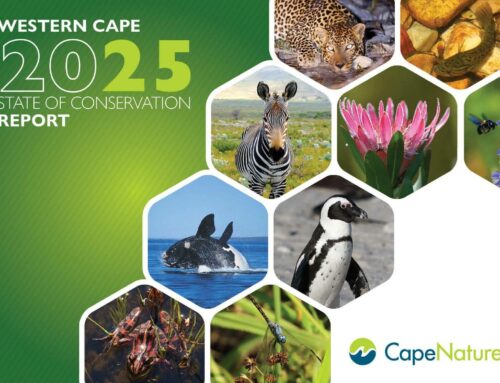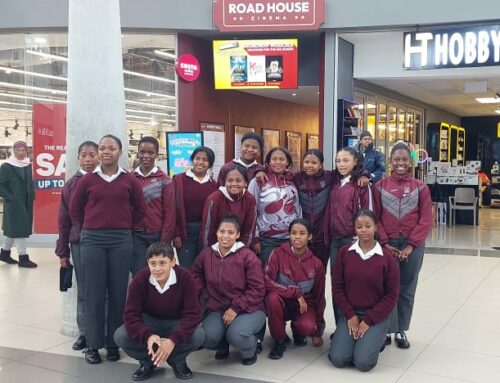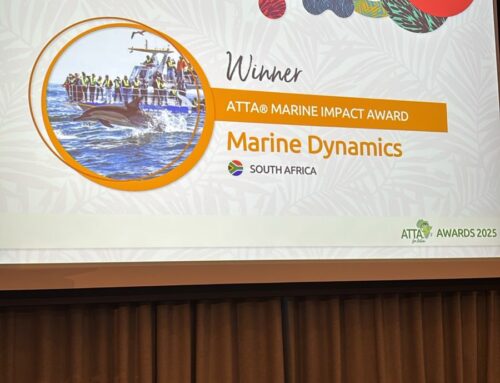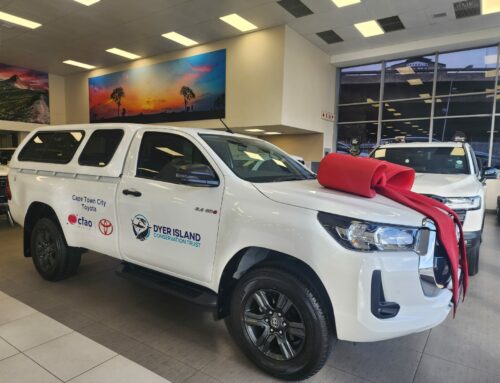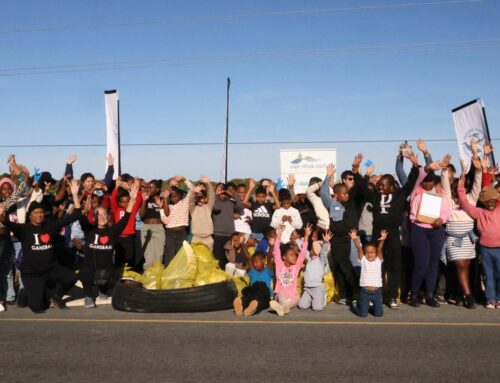Mayoral Committee Member, Alderman James Vos, and his family visited the team at Marine Dynamics, the African Penguin and Seabird Sanctuary and the Dyer Island Conservation Trust, during the winter school holidays. After a visit at APSS, Adl Vos said:
“Had a heartwarming day with my family at the African Penguin and Seabird Sanctuary in Gansbaai! Thanks to the Dyer Island Conservation Trust, Marine Dynamics, and Dyer Island Cruises, these amazing programmes are making a real difference for our marine birds. Truly inspiring to see such dedication in action! Tourism and environmental conservation can thrive together, proving that responsible travel not only enriches lives but also preserves our planet’s natural wonders.”
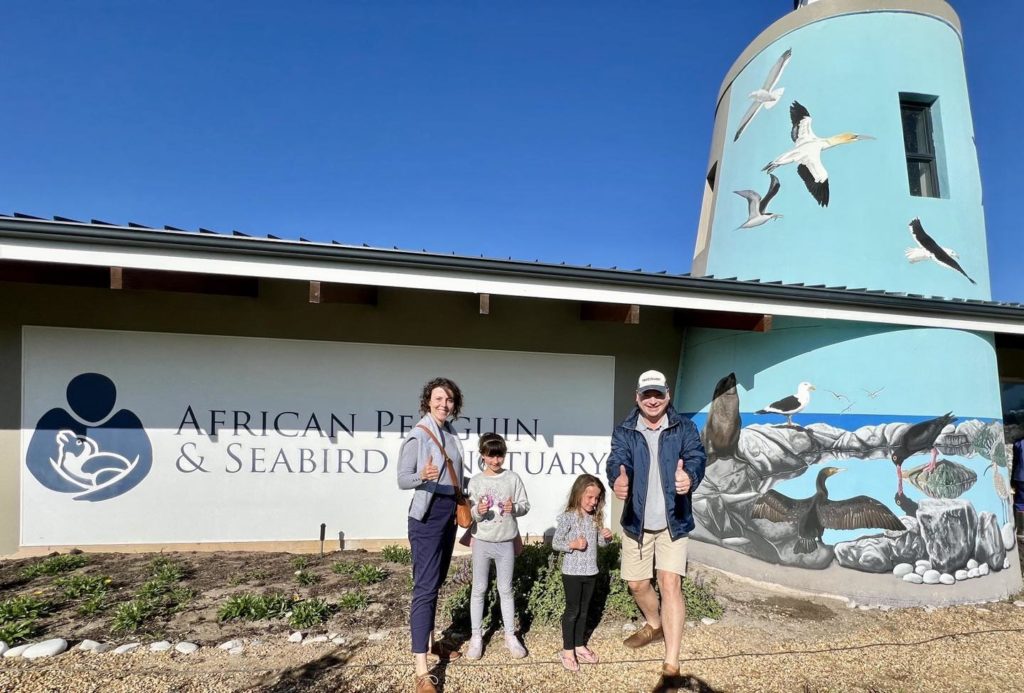
The Vos family joined Marine Dynamics, returning 4 young African Penguin adults, who spent two months at the African Penguin and Seabird Sanctuary, on a journey to take the little ones back to their home colony, on Dyer Island.
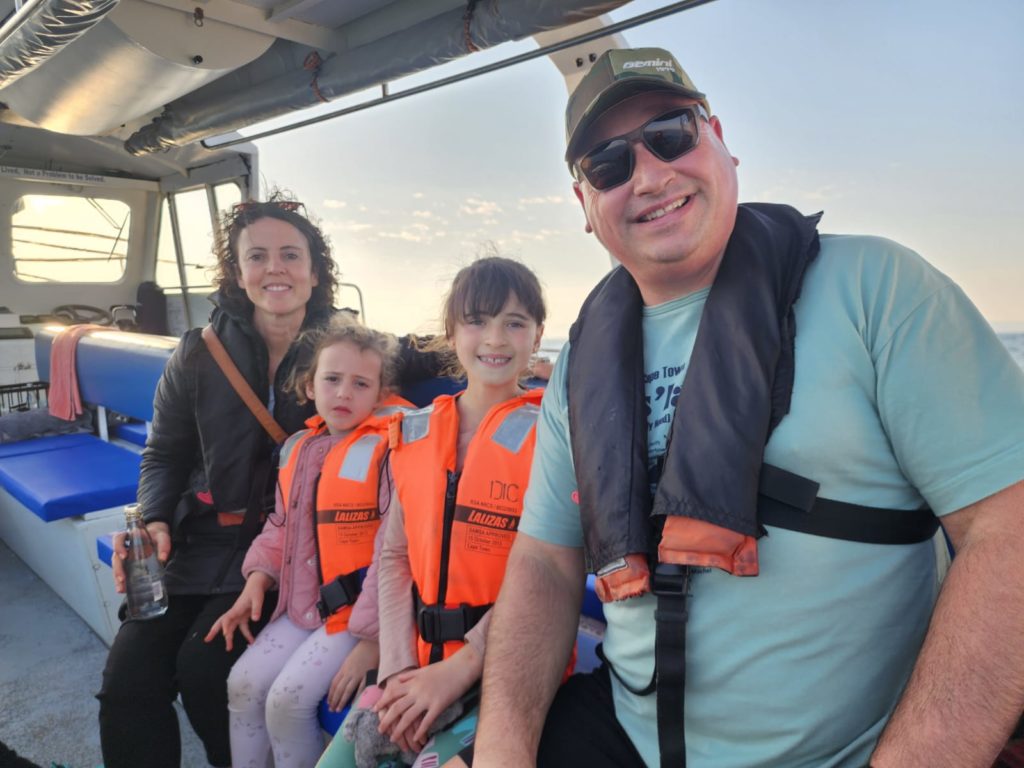
The Marine Dynamics/Dyer Island Conservation Trust seabird ranger on Dyer Island, alerted the team at the African Penguin and Seabird Sanctuary, about 4 underweight penguin chicks on the island. Our bird ranger, plays a very important role on Dyer Island, by monitoring each and every penguin nest and alerting the team to any sick on injured penguin- or seabird. These birds will immediately be transported to the African Penguin and Seabird Sanctuary, where our veterinarian, Dr Annamarie Roberts with her APSS team, will treat these birds until they are fit and strong enough, to go back to their home colony on Dyer Island.
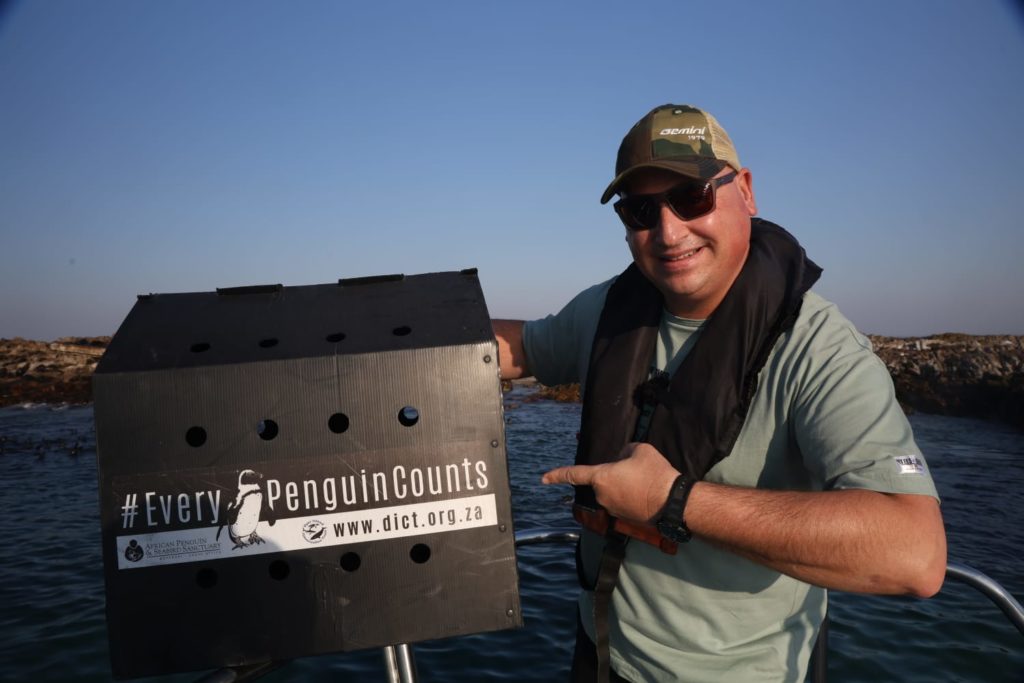
After a lot of tender love, care and good food, they were ready for their first swim in the ocean, ever – a moment, to be treasured.
Alderman Vos had the honour of wishing the little follows well, and assist to placing them back into the ocean.
He also reiterated the importance of supporting eco-tourism organisations, with conservation at the core and sole of the enterprise.
Why does the African Penguin and Seabird Sanctuary need your support? Let’s give you a brief overview of what happened.
As feisty as these adorable tuxedo wearing African Penguin might be, they are now depending on organisations, such as Marine Dynamics and their African Penguin and Seabird Sanctuary, to save them from extinction.
During the last few centuries penguin numbers have fluctuated significantly, largely due to human interference. As early as the 16th century ships passing South Africa on their way to India were using penguins as meat, despite the unpleasantness of their taste. They also collected their eggs, and later used their fat and their carcasses as fuel for ships’ boilers.
A worse impact, however, which still has repercussions today, was guano scraping on the islands. This was used as a fertiliser before the advent of artificially produced ones. From the middle of the 19th century and for about 150 years, 200 000 tonnes of guano were removed from the South African islands. Penguins need this precious material to dig in and make their burrows, which provide them with shelter from the South African sun and predators such as gulls. Nowadays, most birds are forced to breed in open nests, fully at the mercy of the elements and of predators.
Meanwhile, penguin eggs were a common meal for guano scrapers, sealers and other workers staying on the islands. They were also considered a delicacy and exported overseas. Wednesday’s breakfast in the South African parliament was never missed; the traditional fare was scrambled penguin eggs! We estimate that between 1900 and 1930, 13 million eggs were collected from Dassen Island alone on the West Coast.
As a consequence of the above, penguin numbers decreased by 90% during the 20th century.
Ninety birds lost a week for three decades led to the African penguin, South Africa’s only penguin species, being classified ENDANGERED.
From a population of over a million in the 1920s to only 10 400 breeding pairs left in South Africa as of 2022, the African penguin could be extinct in the wild before 2030.
The Dyer Island Conservation Trust has since 2000 been rescuing birds and providing unique nests to help in the fledgling stage.
In 2015 the Trust finally opened the African Penguin and Seabird Sanctuary. With a fully equipped lab and a vet on standby we can immediately treat any birds thereby increasing their survival rate. We are also able to release the birds back on Dyer Island, once a thriving colony at 25 000 breeding pairs in the 70s there are now around 1000 breeding pairs left.
The African Penguin and Seabird Sanctuary also plays a crucial role in education and every day reaches more people with the message of not only our African penguin but all our vulnerable seabirds.
The sanctuary depends heavily on donations to help save our feathered friends. All support in terms of visits, donations and time is invaluable to the successful operation of the APSS and in turn the conservation of the African penguin.
We welcome old towels and newspapers.
We need to build a solid base of volunteers, especially to have on hand for busy times and emergencies. Should you live in the area and wish to become a permanent volunteer please chat to Xolani or Mervin.
Help share our stories via social media – follow us on facebook and twitter (links on screen)
Our corporate sponsorship only covers a third of the costs. There are various ways you can help:
IT’S YOUR LAST CHANCE TO ACT:
– Any cash donation is welcome
– The Fishy Fund is R150 per box of fish
– You can own a penguin home for R500.
– The Booster Block is R1000 and can be done in your name or that of a loved one including ‘In Memorium’. Your name will be displayed at the entrance to APSS.
– Should you wish to leave APSS something from your estate, we would of course be most grateful and ensure you are part of the APSS legacy.
Our team can assist you should you wish to make a donation.
Remember that APSS is a project of the Dyer Island Conservation Trust which is a registered Public Benefit Organisation in terms of section 30 of the Income Tax Act 58 of 1962 and donations to the organisation are exempt from donations tax in terms of section 56(1)(h) of the Act.
(www.dict.org.za / [email protected] / APSS RESCUE LINE: 0725987117/DYER ISLAND CONSERVATION TRUST: 0829075607)

